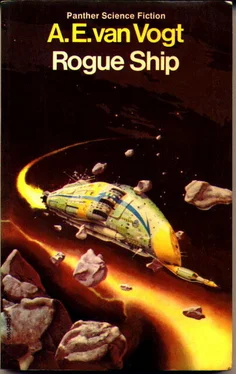A. Van Vogt - Rogue Ship
Здесь есть возможность читать онлайн «A. Van Vogt - Rogue Ship» весь текст электронной книги совершенно бесплатно (целиком полную версию без сокращений). В некоторых случаях можно слушать аудио, скачать через торрент в формате fb2 и присутствует краткое содержание. Жанр: Фантастика и фэнтези, на английском языке. Описание произведения, (предисловие) а так же отзывы посетителей доступны на портале библиотеки ЛибКат.
- Название:Rogue Ship
- Автор:
- Жанр:
- Год:неизвестен
- ISBN:нет данных
- Рейтинг книги:4 / 5. Голосов: 1
-
Избранное:Добавить в избранное
- Отзывы:
-
Ваша оценка:
- 80
- 1
- 2
- 3
- 4
- 5
Rogue Ship: краткое содержание, описание и аннотация
Предлагаем к чтению аннотацию, описание, краткое содержание или предисловие (зависит от того, что написал сам автор книги «Rogue Ship»). Если вы не нашли необходимую информацию о книге — напишите в комментариях, мы постараемся отыскать её.
Rogue Ship — читать онлайн бесплатно полную книгу (весь текст) целиком
Ниже представлен текст книги, разбитый по страницам. Система сохранения места последней прочитанной страницы, позволяет с удобством читать онлайн бесплатно книгу «Rogue Ship», без необходимости каждый раз заново искать на чём Вы остановились. Поставьте закладку, и сможете в любой момент перейти на страницу, на которой закончили чтение.
Интервал:
Закладка:
Hewitt could not recall ever having seen the fellow before. Certainly, he bore no resemblance to Captain John Lesbee, who had commanded the great vessel on its departure six years earlier.
Then and there, Hewitt suspended his judgment. Some of the phenomena suggested the Lorentz-Fitzgerald effect. But most of what he had seen could only be explained if the ship were traveling simultaneously at several different speeds. Impossible.
Hewitt began his retreat from the captain's cabin. His mind was almost blank but he paused long enough to glance in to the other bedroom. There were three beds, each with a young woman in it. They also were covered by thin bedding, but what he could see of them was distorted. He drew back, shuddering. Physiological caricature looked worse on a woman, or so it seemed.
As he emerged onto the corridor again, Hewitt consciously braced himself, consciously accepted the abnormality of his environment. As he raced along in his thick, tank-like suit, he grew more observant and more thoughtful, more willing to see what there was to look at. He began to peer into the apartments that had been built for the ship's officers and for the scientists. In almost every instance the master bedroom was occupied by a woman and the lesser bedrooms by children.
When he saw his first teen-ager, Hewitt lifted the bedsheet from him entirely – it required a very considerable power to do so – and stared down at the distorted body. He wanted to make sure that it was actually a youth. It was. Despite the caricature, there was no doubt. He saw several more after that, and girls as well as boys, some of whom seemed as much as eighteen years old.
But where were the men?
He found, first, three rather rough-looking fellows in apartments along a second corridor, near the captain's cabin. They also were in bed, and since they did not all face in the direction of flight, they presented an amazing assortment. When he lifted the bedsheets from the first man, Hewitt saw a body that was, literally, as thin as a post, gaunt and incredible. The second man was foreshortened. He simply looked crippled, stunted. The third one was narrow through the thickness of the body, a mere sliver of a man, like a silhouette.
Except for these three, he saw no other men until he came to the large semidormitories on the lower decks. Here, in the small bedrooms that led off the large lounges he found what he estimated were several hundred men. No women were among them, which was puzzling. There seemed to be no reason for having the men down here and the women and children on the upper floors.
Hewitt was bemused now. As he headed for the engine room, it was apparent to him that this ship had aboard it men, women, and children of all ages, and that he knew not a single one of them. He who had met all of the colonists, technical people, scientists, women, however fleetingly in some instances, recognized not one person.
Hewitt reached the engine room. His first glance at the line of meters shocked him.
The pile was as hot as a hundred hells. The transformer output meter needle was amazingly steady for the colossal load it was bearing. And the resistance to acceleration must be tremendous, for the accelerometer essentially registered zero. As he studied the instruments, Hewitt found himself remembering his conversation with Tellier about attempting to reach the speed of light. Suddenly, he frowned. The figure he was getting from the velocity integrator was surely wrong: 198,700... Faster than light!
Hewitt thought, 'But surely that doesn't mean it still-'
His mind refused to hold the thought. Right there he began his retreat, back to the airlock and the Molly D.
24
During Hewitt's absence from the salvage vessel, a great man had come aboard. He listened with the others to Hewitt's account, and then remained silent and thoughtful through most of the discussion that followed. His presence had a subduing effect on the younger government scientists aboard. No one had very much to say. The attitude seemed to be: 'You stick your neck out first!'
As a result, the conversation remained 'close to the ground.' Phrases like 'a natural explanation' abounded. When he had listened to all he could stand, Hewitt said impatiently, 'After all, these things have happened. What do we mean by natural?'
He was about to say more, when the great man cleared his throat and spoke for the first time since he had been introduced. 'Gentlemen, I should like to try to clear away the debris that has accumulated at the beginning of this obstacle course.'
He turned to Hewitt. 'I want to congratulate you, sir. For the first time in history, the mythical observer – that mathematical oddity – has come to life. You have seen phenomena that, till now, have never been more than a set of equations.'
Without any further preliminary, he launched into an explanation for what had happened, in which he accepted that 'aspects of speed of light are involved.' He continued, 'At this stage we need not concern ourselves with how this can possibly be, though speculations are unquestionably in order. I toss in one of my own. Mr. Hewitt saw that the velocitors showed a speed of more than light-speed. Is it possible that in attaining such a speed, the ship is confronting us with a true condition of space and matter which has hitherto been hidden from us? I speculate that the ship is traveling at more than light-speed in its own zone of existence, in a sort of parallel time to now, this minute, this second.'
Further knowledge of the event was of course needed. But it could wait. He went on, 'The time has come for a practical solution. I offer the following.'
Copies of a carefully written letter must be placed in the hands of various key personnel on the ship, for them to read when they awakened.
In the letter the circumstances would be described, and those in charge would be urged to cut off both the drive and the robot pilot. If this were not done within a certain period -taking into account the difference in time rate – it would be assumed that the letter had been misunderstood. At this point Hewitt would go aboard, attempt to shut off the robot, and reverse the drive personally.
However, before leaving the ship after delivering the letter, Hewitt should set off a general alarm aboard to ensure that the awakening took place quickly.
Hewitt frowned over the suggestion. He could think of no logical reason why it shouldn't work. And yet, having been aboard that foreshortened, eerie vessel, with its nuclear piles operating to the very limit of safety and its lopsided passengers moveless as in death, he had a feeling that some factor was being neglected.
He found himself remembering, the man crumpled against the headboard of the bed in the captain's cabin. Such an incongruity needed to be explained. But the older man's words had also brought several thoughts of a practical nature. His tank suit needed to be modified and equipped with power tools to set off the alarm, and to perform labors that would be necessary within the frame of such a time difference. And, as for making a third trip later on, he said slowly, 'If it turns out that I have to shut off the drives also, then I'll have to take along food and water. The time difference could make such a task very involved.'
It had required thirty-five hours to open an airlock, which normally took five minutes. By comparison, reversing the drive might involve weeks of not necessarily hard but certainly persistent labor. It would be better if those aboard could do it.
Another scientist suggested that the suit might also be fitted with instruments for detecting and observing and recording the drive states connected with light-speed phenomena.
This thought unleashed a tornado of excited, creative ideas, which Hewitt finally stopped with the statement: 'Now, look, gentlemen, only so much additional equipment can be added to this suit. So why don't a couple of you come down with me to the factory, and you can work with them to add the possible modifications? Meanwhile, the letter can be written and copies made. We should be back here reasonably soon, and then I'll go aboard again.'
Читать дальшеИнтервал:
Закладка:
Похожие книги на «Rogue Ship»
Представляем Вашему вниманию похожие книги на «Rogue Ship» списком для выбора. Мы отобрали схожую по названию и смыслу литературу в надежде предоставить читателям больше вариантов отыскать новые, интересные, ещё непрочитанные произведения.
Обсуждение, отзывы о книге «Rogue Ship» и просто собственные мнения читателей. Оставьте ваши комментарии, напишите, что Вы думаете о произведении, его смысле или главных героях. Укажите что конкретно понравилось, а что нет, и почему Вы так считаете.











